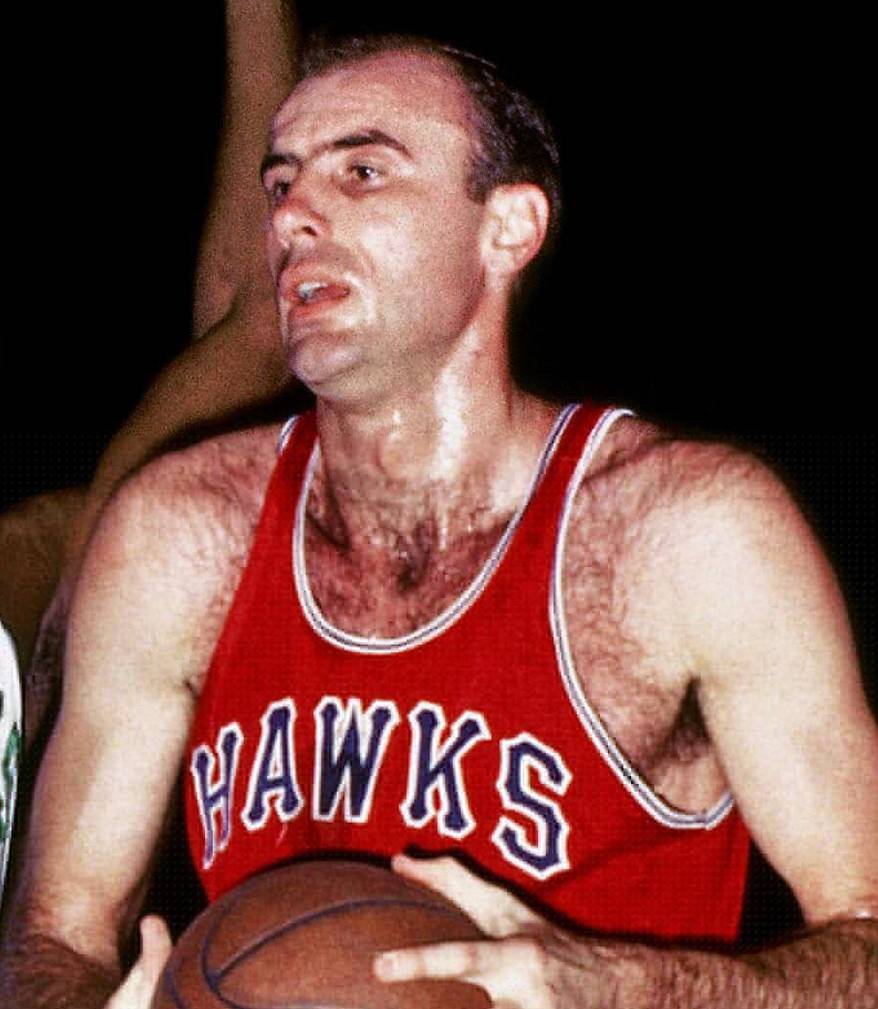
Bob Pettit
Sport: Basketball
Induction Year: 1973
University: LSU
Induction Year: 1973
From 1957 through 1966, the Boston Celtics won nine of 10 National Basketball Association championships.
For years, Celtics coach Red Auerbach would needle Tom Heinsohn about the one that got away: “We would’ve won 10 straight if you had held Bob Pettit to 48 points.”
Pettit scored 50 points in the final game of the 1958 playoffs, accounting for 19 of the St. Louis Hawks’ last 21 points. His jump shot with 15 seconds remaining in the game wrapped up the title.
That’s not too shabby for a guy who was cut from the junior varsity team as a sophomore at Baton Rouge High School.
There were 17 candidates for that team, and five of them – including Pettit, who was then an awkward 5-11 – didn’t make it. Although Pettit led his Baton Rouge High team to the state championship two years later, Coach Kenner Day would always be introduced as “the man who cut Bob Pettit from his team.”
For one generation, Pettit was an example of perseverance leading to sports greatness. He played church league basketball as a sophomore, grew five inches in less than a year and made the All-City prep team as a junior. The next year, he was nearly 6-7. He not only led Baton Rouge High to the state title, but was selected to play in a North-South all-star game at Murray, Ky.
He had scholarship offers from 14 universities, but seriously considered only one: Louisiana State University.
Pettit averaged 30 points a game in leading the LSU freshmen to an 8-2 record. The following year, he averaged 25.5 points to rank third in the nation and lead the Tigers to 17 victories in 24 games.
Joe Dean, who is now Athletic Director at LSU, was a senior guard who gave the sophomore center a piece of valuable advice during that season. “Bob,” he said, “you are only as good as you think you are. Any time you walk on that basketball court, you have to think you are the best player out there. You cannot believe there is anybody better than you, or that anybody can stop you.”
In 1952-53, Kentucky’s basketball program was shelved by an NCAA probation and LSU sailed through a 23-game regular-season schedule with only one loss (to Tulsa), qualifying for the NCAA playoffs with a clean sweep of Southeastern Conference opponents. The Tigers won the regional title in Raleigh, N.C., but fell to Indiana in the semifinals of the Final Four at Kansas City and then lost a third-place game with Washington.
Facing collapsing zone defenses and missing four games because of a bout with pneumonia, Pettit slipped to 24.7 points per game that season.
As a senior, he was unstoppable – setting an SEC scoring record of 60 points against Louisiana College in his second game that wasn’t broken until Pistol Pete Maravich came along 15 years later. He became the second player in major-college basketball history to aver more than 30 points a game, but didn’t win the national title because the other one – Frank Selvy of Furman – was setting a record of 41-7 points per game in the same season. Pettit’s average of 31.4 was an SEC record until Maravich broke it in 1968.
Once again the Tigers had a perfect regular-season against SEC opponents. But Adolph Rupp’s Kentucky Wildcats were back in business, matching that record to set up a one-game playoff at Nashville for the conference title. Kentucky won the game, 63-56, but passed up the NCAA playoffs. LSU went to a regional tournament in Iowa City and lost to both Penn State and Indiana.
This was 1954, and all 12 players on an East College All-Star team that many observers considered to be the best group ever assembled were white. Two of them, Selvy and Pettit, were the first two players selected in the NBA draft. The Baltimore Bullets chose Selvy No. 1, and the Milwaukee Hawks took Pettit.
He signed a contract with Hawks owner Ben Kerner for $11,000 – an all-time high for an NBA rookie. “I had only $100 in the bank when I graduated from college,” Pettit recalled later, “and $11,000 looked like all the money in the world to me.”
The Hawks would up with both Pettit and Selvy when the Bullets folded, and they combined for 40 points a game as rookies. Pettit became the second rookie to win all-pro honors. But the team finished last in the Western Division, and moved to St. Louis before the next season got underway.
Three years later, the Hawks were world champions and Pettit was on his away to becoming the first NBA player to break the 20,000-point barrier. He averaged 26.4 points per game for his career and was an all-pro selection every season that he played except one.










